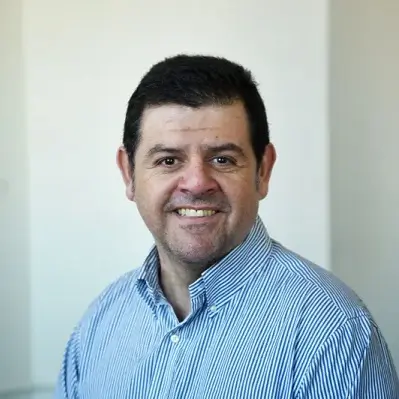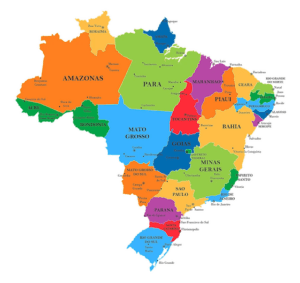
Marco has been inside the language teaching environment since 1995.
He has taught ESL, EFL and ESOL as well as Spanish and Portuguese at Texas A&M International University and the University of Massachusetts, Amherst. He enjoys the classroom setting because it is the place that everyone, including himself, has the potential to learn and grow. Currently, Marco also teaches Spanish and Portuguese for the International Language Institute of Massachusetts.
In our conversation, we discussed Marco’s multicultural upbringing, educational systems in Brazil and the USA and his advice for learning Spanish and Portuguese.
What was your upbringing like? You speak Spanish, Portuguese, and English, right?
I grew up in Brazil and in the United States. My mother moved to the U.S. in 1986, and I followed in 1987. When I was nine years old, I went to elementary school in Los Angeles. I also spent time living in Brazil for most of my teenage years, all the way up to early adulthood. For college, I studied in the U.S. at Glendale Community College, and then moved to the University of Southern California, where I earned a BA in business.
When I came to the U.S., we lived in a Latino neighborhood, so I would try to speak Spanish with friends on the street, and I took Spanish classes throughout middle school and high school. My upbringing afforded the opportunity to have contact with two cultures–Brazilian and American–while also having Latino friends and friends from other ethnicities.
How did you become interested in teaching languages and being a Spanish, Portuguese, and English instructor?
If I can rewind a little bit, when I was a junior in high school, I had a chemistry teacher, Miss Burgess, who asked me to tutor a student in chemistry. I embarked on it, happy and excited. That was my first job working in education.
I think the profession chose me. I didn’t choose the profession. In middle school or high school, I studied as if I were teaching myself. I imagined I was a teacher explaining the content in front of a mirror, or to my mother as she listened.
In Brazil, at the age of 16, I got a job teaching English. I eventually moved on to teaching English, Spanish and Portuguese here in the U.S.
So with your experience going back and forth between the US and Brazil, teaching and speaking Spanish, Portuguese and English, what observations can you make about the cultures of Brazil and the U.S.?
Since I work in education, I’m going to talk about my field. We both have issues with our educational systems, whether it’s in Brazil or in the U.S. When I was in California, the public high school that I attended was not very challenging. Only a small group of people had access to AP courses. Most students were taught just the basics. It was a kind of educational apartheid.

This system separates students in terms of gifted versus non gifted, and then the gifted students have access to better teachers and more challenging courses. Most assessment is done by standardized exams, and the stratification happens early on. There’s a decision that one group of students is more talented or more gifted than others, so they have access to courses that others don’t.
This varies from school to school and from district to district. In California, the issue was that they didn’t have school space to put more students into gifted classes. They said, “Oh, we have to do a cap of 30, and that’s it.” Only 30 people could take the course. That’s very limited access. On the other hand, I studied for six months in Tennessee where the school district had money and resources. When I asked for challenging courses, they were glad and said, “We can definitely allow you to take them, no problem.”
In Brazil, there’s a huge gap between public and private schools. The majority of the middle class and wealthy send their children to private schools, while public schools are for lower middle class and the poor. Public schools in Brazil have issues with strikes and teachers not being substituted due to illnesses or personal reasons, so you might not finish the school year on time. It’s much harder for private school teachers to go on strike.
In the U.S., students take basic courses and choose their electives whereas in Brazil, all students take the same courses. The content is given to all students, and there are around 14 subjects per school year. All students take Math, Portuguese, Biology, Chemistry, Physics, Sociology, Philosophy, a foreign language and so on. In the U.S., I had access to the humanities but not very much to sciences in high school. Once again, there was this idea back when I was in middle school and high school that I should be placed in basic math and sciences courses and more challenging humanities courses. I believe high school students should be challenged in all subjects because they all matter. People change and so do their interests. An educational system that teaches the basics and electives may be nearsighted. It makes the assumption that students have talents in certain subjects but not in others, rather than challenging students to think scientifically, humanistically and artistically and how these ways of thinking can contribute to making someone more fulfilled as a human being. The world is a complex place with lots of difficult issues that can be better understood if we have a well-rounded educational system. To achieve this, we need to challenge students in the humanities, the sciences and the arts altogether.
To sum up, my high school educational experience in the American school system was marked by the notions of separation, stratification among talented versus non-talented, gifted versus non-gifted, academic versus non-academic. The educational content and expectations are not the same to all students, and the decision to differentiate content is made early on in a student’s pathway through basic education.
One thing that I like about the Brazilian system despite all of its dire challenges is that the content is given to everyone. I was not separated into a gifted class versus a non-gifted class. I don’t even like the term “gifted.” It is as if someone has a biological endowment to learn poetry or math. Teachers should instigate curiosity and passion in students and hold them accountable for learning and developing critical thinking skills. A chemistry course is taught to everyone, including the student who is seen as gifted and the student who is struggling. At least, in this sense, there is no apartheid in terms of students’ expectations.
How do these observations about U.S. and Brazilian educational systems affect your approach to teaching? How do you bring that into your language classes?
My philosophy is that teaching is a two-way street. I learn from my students, as well as facilitate learning to my students. They bring valuable and rich knowledge from different walks of life. A classroom that respects people’s individuality and diversity contributes to learning languages. We learn through this sharing of experiences and knowledge, not just by analyzing grammar or memorizing vocabulary. The teacher is not the center of the classroom: the students and the teacher are. It’s a two-way street.
Thanks for chatting with us about learning Spanish and teaching Portuguese classes. To wrap up, do you have any advice for Spanish or Portuguese language learners Portuguese classes or a Spanish course now?
Focus on comprehension and getting the meaning of sentences, and put yourself into interactional situations. Nowadays, we’re often isolated in front of our computer. Trying to learn a language by yourself is not a strategy that I would follow. Learning a language involves interacting, listening, and talking. It involves telling people how you feel, expressing your emotions and sharing your knowledge. This can be achieved with in-person and remote courses because they all offer opportunities for interaction.
The U.S. has a high number of Spanish speakers, so go to a Spanish-speaking restaurant and try to order a meal in Spanish. In Massachusetts, there are Brazilian Portuguese, European Portuguese and Cape Verdean communities, so you can go into these neighborhoods, markets and restaurants. Put yourself out there interacting and focusing on meaning without worrying about uttering perfect grammatical sentences with a native accent. There is no need to be self-conscious because all true language students are constantly developing their language skills.
For related articles about studying Spanish, learning French, taking Portuguese lessons and more:
- Why Learn Spanish in the USA?
- Great ways to learn Spanish online and why it’s important.
- Top 7 reasons to speak and learn Spanish fluently in the USA.
- Improve your listening skills in 4 easy steps!
- The Rejection of Perfection in Learning a Language
- Spanish is Darlene’s Superpower: Interview with Darlene, a Spanish language student living in the USA.
- World of jazz: Interview with Andy Jaffe, a Portuguese and Chinese language student living in the USA.
- Kathy Learning Spanish (again): Interview with a Spanish language student living in the USA.
- How Alice Flexes her Brain Through French film: Interview with a French and Spanish language student living in the USA.
- Charles the language person: Interview with an Italian and German language student living in the USA.
- Takehiro Rises: Interview with an ILI English student from Japan who built a career in the USA.